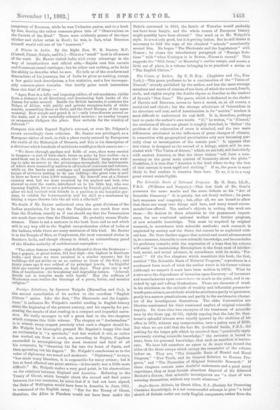A Winter in India. By the Right Han. W. E.
Baxter,- M,P. {Cassell, Petter, Galpia, and Co.) —This is a" small" book in all senses of the word, Mr. Baxter visited India with every advantage in the
Way of introductions and official aids,—Raj abs sent him escorts and Governors camel carriages ; but he either saw nothing, or he lacks the ability to describe what he saw. He tells us of the comforts and 'discomforts of his journeys, but of India be gives us nothing, except a few guide-book descriptions, a few statistics, and a few incompar.
ably common-place remarks. One hardly gains much instruction from this kind of thing Agra Fort is a lofty and imposing edifice, of red sandstone, visible from a distance in all directioue, and dominating both banks of the .Jumna for miles around. Beside the British barracks, it contains the Palace of Akbar, with public and. private reception-halls of white marble, resembling those at Delhi, and the Pearl Mosque, of the same material. How simple and grand it is l—only lotuselowers carved on the walls, and a few tastefully-coloured mosaics ; no tawdry images or ornaments disfigure the place. How suitable for the worship of Jehovah Compare this with Bayard Taylor's account, or even Mr. Pidgeon's recent exceedingly short criticism. Mr. Baxter was privileged, as a European visitor of rank, to visit a place rarely entered by Europeans the castle of the Maharajah of Benares, and this is his description of a structure which hundreds of architects would give their ears to see :— " We drove through gardens and fields of corn, then were carried in tangans—a sort of bath-chair, borne on poles by four coolies—to a sand-bank out in the stream, where the 'Racehorse' barge was wait- ing to take us across to the picturesque stronghold, the battlements vof which were manned by natives in altkincla of costumes and colours ; while on the banks were carriages and caparisoned elephants, and troops of servants waiting to do our bidding—the groat men is said to have no fewer than 3,000 retainers. He himself was at a distant -country seat, but we wore received by his nephew and heir, who 'showed us over the castle, introduced us to his little boy, who was learning English, lot us see re performance by Nan tub girls, and came, after we had lunehed with friends in a pavilion in the beautiful gar- dens, to exhibit his horsemanship and his skill as a marksman by hitting a rupee thrown into the air with a rifle-ball."
We doubt if Mr. Baxter understood even the great divisions of the Indian population, for he says the Punjabees are much finer men than the Ilindoos, exactly as if one should say that the Pomeranians are much finer men than the Christians. He probably means Hindu- stanees. There is net a sentence in the book from end to end which will in any way add to the English comprehension either of India or the Indians, while there are many sentences of this kind. Mr. Baxter is in the Temple of Siva, at Conjeveram, the most venerated shrine in Southern lnclia, and though clumsy in detail, an extraordinary proof of the Hindoo audacity of architectural conception :— "The other famous temple—that dedicated to Sava the Destroyer— has a gopura, or great tower, 151. feet high—the highest in Southern indie—and there we were received in a similar manner; hut its buildings did not strike MI as so curious as those of the first ; and thirty years ego it was robbed of its principal jewel. Its frightful :idols are carried in procession on high days. They give one a sad idea of heathenism—its brutalising and degrading nature. Jehovah dwells not in temples made with bands,' May the millions of Hindostan soon realise the blessings of a purer, holier, and manlier religion I"






































 Previous page
Previous page